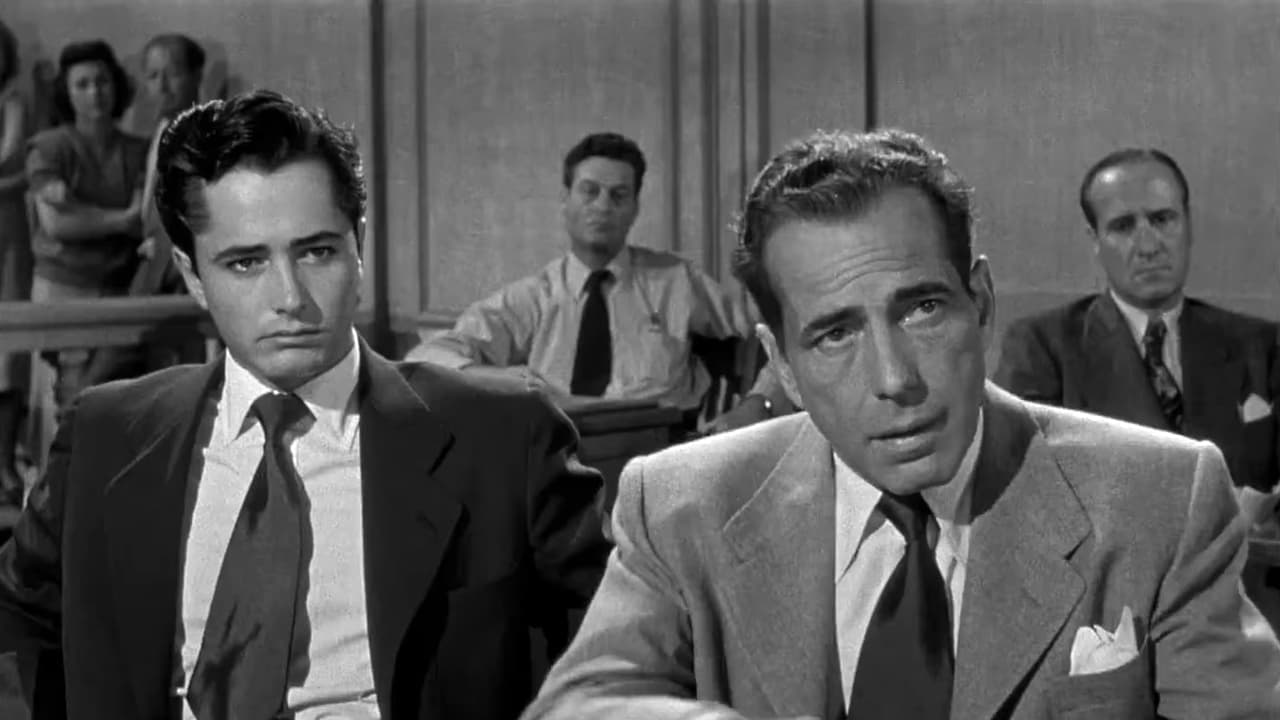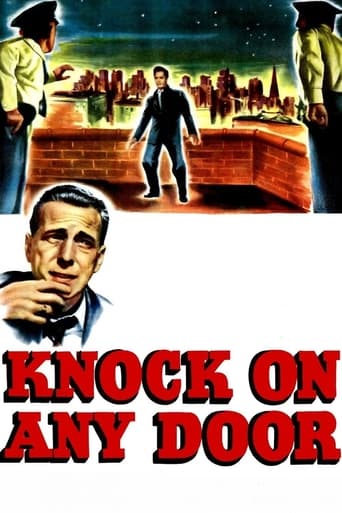

. . . This question from sociopath Nick "Pretty Boy" Romano is the crux of KNOCK ON ANY DOOR. If you paraphrase what Nick's defense lawyer, "Andrew Morton" (Humphrey Bogart) says to the judge before Nick is sentenced to fry on an upcoming "Fri-day" (you can't make this stuff up!), it sounds like this: America's treatment of Her sociopaths is inhumane. Nick says several times that all he really wants to do is to "die young, and leave a pretty corpse." Anyone familiar with the Ethel Rosenberg case knows that electrocution frequently turns the victim into smoldering meat, which is not only NOT pretty, but not very appetizing, either. KNOCK ON ANY DOOR makes it clear that Nick has very little fun terrorizing all the local business and automobile owners with his constant armed thefts. Driving his wife to suicide is very hard on him. Killing his first cop gives Nick the jitters. Therefore, counselor Morton demands that all high school dropouts and first-time felons be tested while they're youths (still "pretty," and Un-fried) to see if they're sociopaths. If they are, Society owes it to them to provide a fatal overdose of something that will allow them to rest easy, "die young, and leave a pretty corpse" WITHOUT going through the trauma of leading a life of crime, followed by 20 years on Death Row, and public burning in the electric chair (or whatever the flavor of the month is on Death Row). After all, as Nick says here, they "didn't ask to get born."
... View MoreAs in THEY LIVE BY NIGHT and later REBEL WITHOUT A CAUSE, Nicholas Ray explores the life of a troubled youth, driven by fate and circumstance to exist outside societal rules. In this case, John Derek is a fella from the slums, being defended by attorney Humphrey Bogart for the murder of a policeman. The film uses a series of flashbacks to reveal the developing relationship between the two as Bogart tries to reform the boy but his efforts are thwarted by the cold, unfeeling world around them. Even as a bleeding heart liberal, I found the moralizing a bit much, especially in Bogart's pleas to the jury. However, the performances are excellent and the film has a sensitive, poetic rhythm to it. The stylish camera-work by Burnett Guffey (one of the greats) maintains the noir vibe, with some gorgeous sequences. Also, the third act is a courtroom drama that manages to avoid a lot of the predictable tropes. Perhaps too earnest and a tad too slow, but a sorrowful and often beautiful movie.
... View MoreThe message of this film is very important, and something we can think about today.I will not ruin this plot for those who have not had the time to see it, but I recommend this as one of those 'hard to find' movies from Bogart's large collection.For a thriller, this is the perfect ingredients. You have a good leading man, and a story centered around crime. The ending is one in a million. I disagree with the first review on this page, in no way does this film try to "glorify a hoodlum" the message is something we need to think about today when we see all these gang bangers on the news murdering people. There's a way we can do without all of that. This movie, should be a warning why you should not do those kind of things.
... View MoreWhile it may be argued that the picture presents an extremely liberal viewpoint on the causes of teenage crime, it is nonetheless an excellent film. John Derek, as Nick Romano, is absolutely fabulous in the lead role. He is certainly depicted here as a victim of society. When his father dies in prison, after being sent there due to shoddy work by his attorney, Derek becomes embittered and turns to crime. The reform school is shown as a place that hardens this young man.He meets his Juliet and for a time things are looking up until the lure of the streets, his inability to handle a job, the poor company he keeps and the crowd that he runs around with, all lead to tragedy.Humphrey Bogart is equally impressive in the role as the attorney for Nick. His impassioned plea for mercy at the end of the film is done extremely well.Look for Sid Melton as a young hood with a variety of marvelous supporting performances, especially that of George MacReady as a relentless prosecuting attorney.
... View More